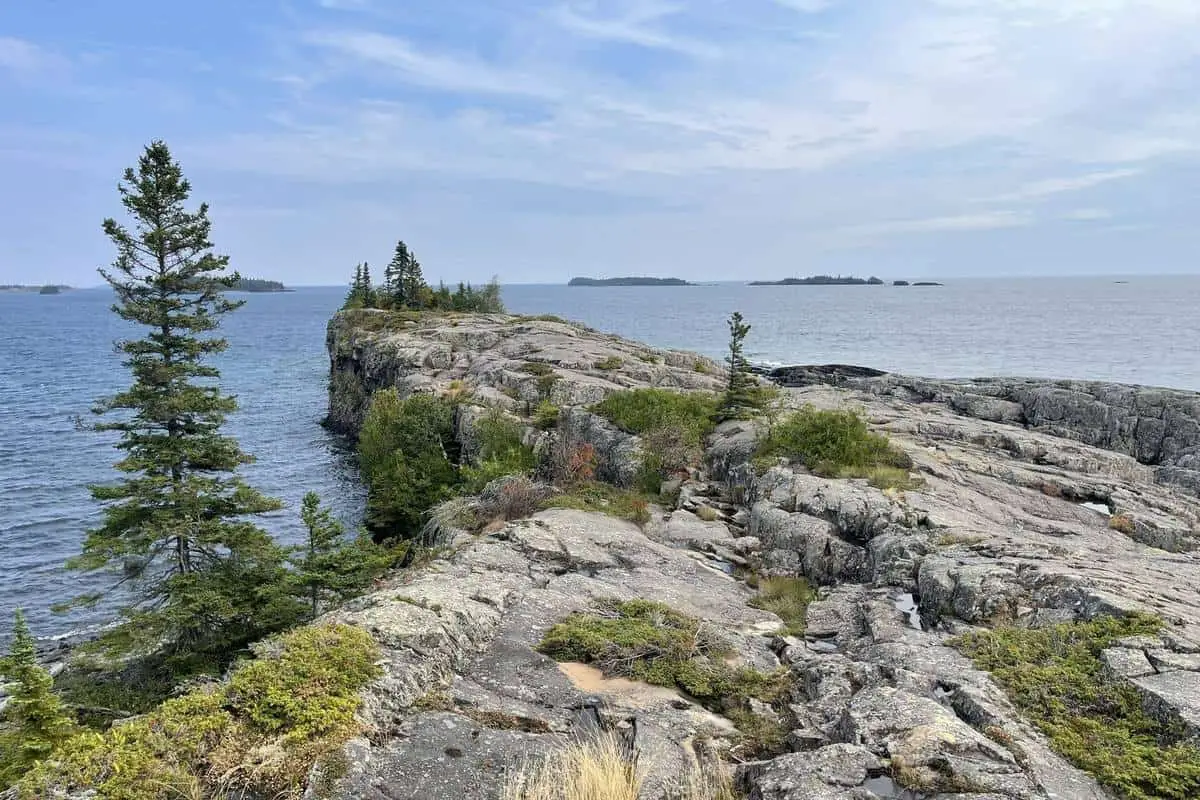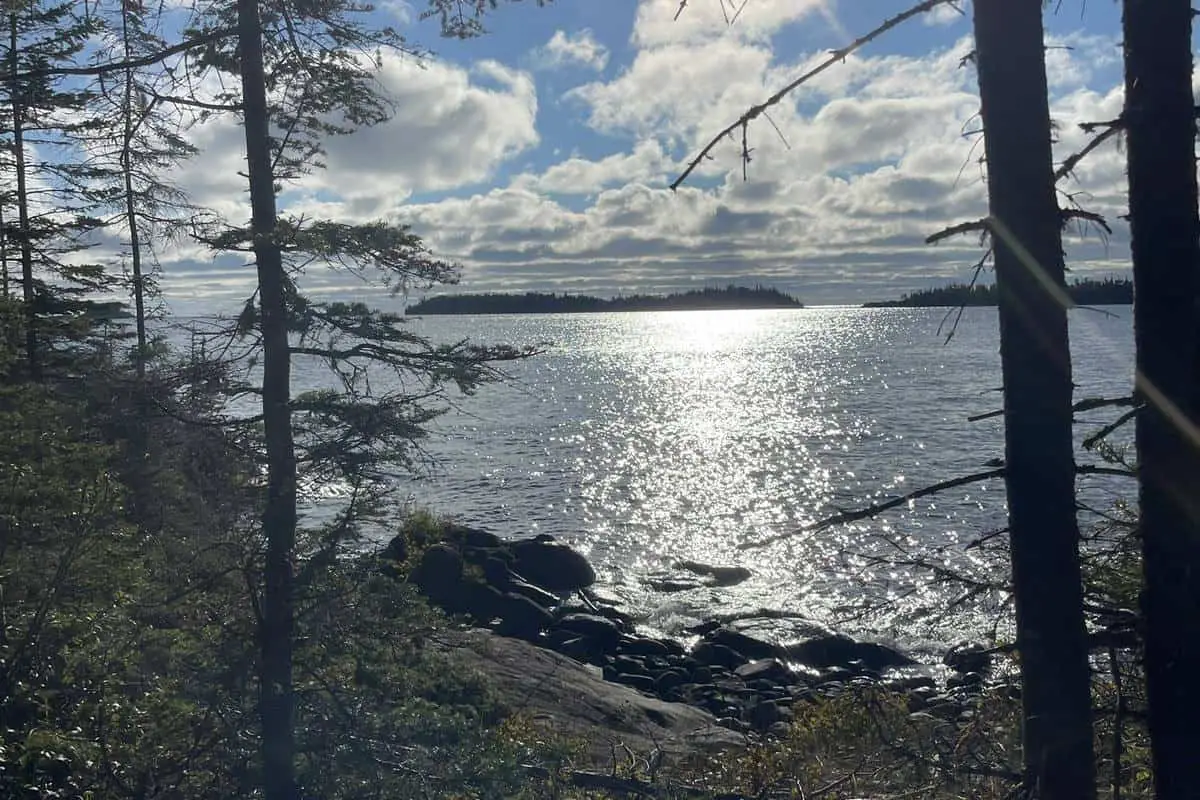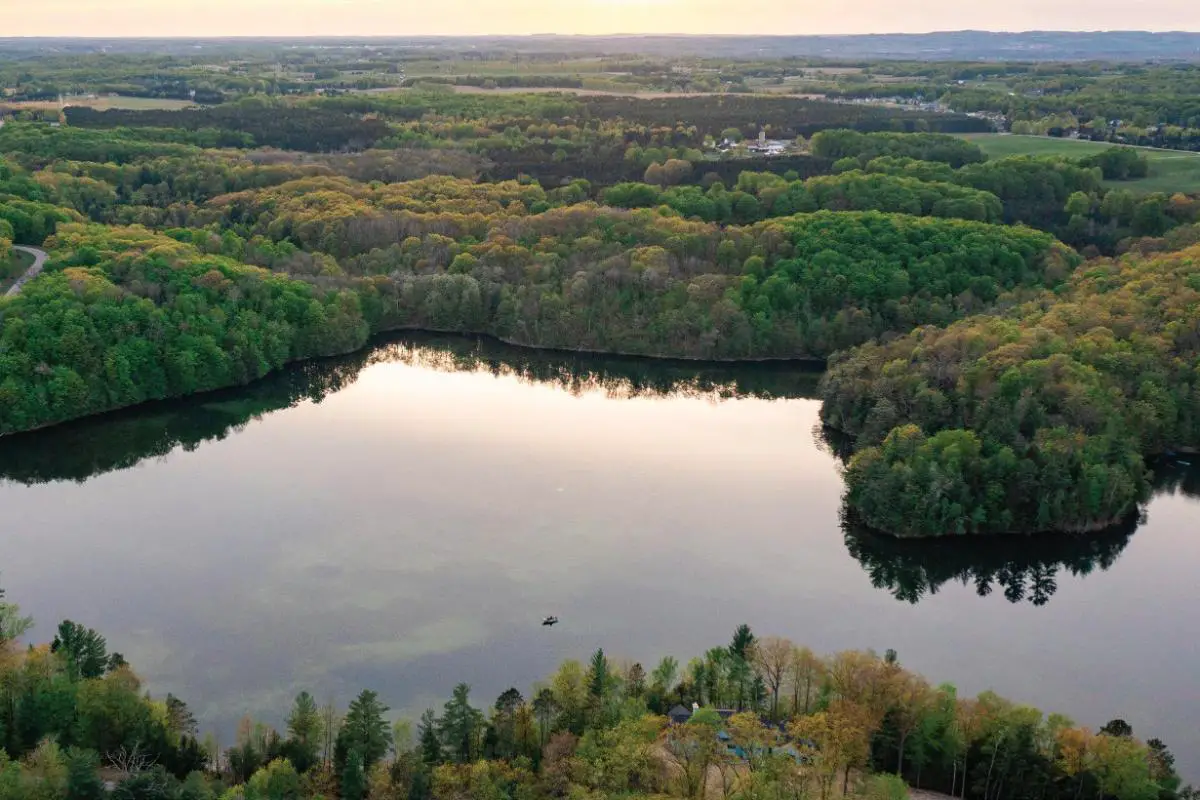

4 Isle Royale National Park Boondocking Locations: Isle Royale National Park stands out for boondocking since it’s packed with remote campsites you can only reach on foot or by boat. Boondocking here means camping at one of the 36 scattered campgrounds—no vehicles, no hookups, just you and the wild. It’s a real wilderness experience that lets us soak in nature at its purest.
Campsites like Lake Whittlesey and Moskey Basin lure folks looking for solitude and killer views, these are the right Isle Royale National Park boondocking locations for you. The main island has several official spots, but don’t plan on cross-country camping on the smaller islands or inland lakes—they don’t allow it. Getting to these sites and knowing the rules is half the adventure.
Key Takeways
- You can only get to Isle Royale National Park boondocking locations by foot or water—no vehicle access.
- Isle Royale National Park boondocking locations remote sites mean solitude and views, but facilities are barebones.
- Knowing where you’re allowed to camp and how to get there matters.
Isle Royale National Park Boondocking Locations
When we talk about Isle Royale National Park boondocking locations, we mean camping in primitive, remote spots—definitely not your standard campground. There are over 35 rustic campsites scattered across the island, all accessible by hiking or paddling. That’s as wild as it gets.
We’ve got options: hike-in campsites and dispersed campsites, both offering quiet and a deeper connection to nature. Popular remote Isle Royale National Park boondocking locations include Rock Harbor, Moskey Basin, and some truly off-the-beaten-path spots. Most have a simple shelter or a tent pad and maybe a basic water source—don’t count on amenities or power.
The park asks us to camp lightly and leave no trace. We bring everything in, pack everything out, and help keep these wild places wild. Using dispersed camping spots also helps keep the main campgrounds from getting crowded.
Maps showing all the campsites and shelters make planning way easier. That way, we find quiet, safe places to stay—and don’t wreck the environment in the process. Nights here are dead quiet, except for the wind in the trees or maybe a loon calling.
If you’re craving a real-deal wilderness trip, Isle Royale National Park boondocking locations deliver. It takes some prep, but the payoff is worth it.
Outdoor Activities And Nearby Attractions At Isle Royale National Park Boondocking Locations
Isle Royale National Park boondocking locations are a playground for outdoor lovers. Camping and backpacking top the list, since all 36 campsites are only reachable by foot or water. That’s a recipe for peace and quiet.
Hiking here is fantastic—over 160 miles of trails, all wild, some tough, some easy. You’ll find everything from gentle walks to steep climbs, and the scenery is always worth it: wetlands, wildflowers, and those endless Lake Superior views.
Wildlife watching? Oh, you’ll see moose, maybe hear wolves, and spot plenty of birds. Fishing in the lakes and streams is a mellow way to pass the time and maybe catch dinner.
Kayaking and canoeing are big, too. With no cars, paddling between the 450 islands feels almost surreal. You can reach places most folks never see.
Come fall, the leaves put on a show. Forests, old lookout towers, and even shipwrecks are scattered around for exploring.
Key activities at Isle Royale:
- Camping & Backpacking
- Hiking & Trail Exploring
- Wildlife Viewing (Moose & Wolves)
- Fishing
- Kayaking & Canoeing
- Scenic Fall Colors
All these activities make it easy to get lost (in a good way) in Isle Royale’s wild landscape.

Staying On The Upper Peninsula Of Michigan And Traveling To The Park
If you’re heading to one of the many Isle Royale National Park boondocking locations, staying in Michigan’s Upper Peninsula is a solid move. The UP’s full of state parks and campgrounds, so you can get a good night’s sleep before the real adventure starts.
Lake Superior hugs the UP, so you get killer views and plenty of stuff to do outdoors. Copper Harbor on the Keweenaw Peninsula makes a great base camp. From there, you can hop on a ferry or boat to the island.
Ferries leave from places like Copper Harbor and Houghton, and the ride over Lake Superior takes a few hours. Booking ahead is smart, especially during peak times.
Camping or staying near ferry launch points makes the early morning hustle easier. State parks nearby are convenient and usually pretty affordable. You can load up on supplies in town—once you’re on the island, options are slim.
| Location | Distance to Ferry | Facilities | Notes |
|---|---|---|---|
| Copper Harbor | Ferry departure | Lodging, camping, shops | Scenic harbor views |
| Keweenaw Peninsula | Varies | Multiple parks & trails | Rugged outdoor options |
| State Parks (UP) | Near ferry points | Camping, picnic areas | Affordable and quiet |
Staying in the UP lets you settle in, soak up some Michigan nature, and get ready for the island.
Directions To the Park
First, you’ll need to get yourself to Houghton, Michigan. That’s the main jumping-off point for Isle Royale.
From Houghton, hop on a ferry or book a seaplane. Main ferry services run out of Houghton and a couple of other towns. They’ll haul you and your gear, but if you’ve got your own boat, that’s an option too.
Once you land on the island, you’re on foot or in a kayak to your Isle Royale National Park boondocking location—no roads, no vehicles. Get around by hiking or paddling to your boondocking spot.
Just a heads up: ferries and seaplanes are run by outside companies, not the park. Check the schedules and book early—those seats fill up fast in summer.
Here’s a quick rundown:
| Step | Action |
|---|---|
| 1 | Travel to Houghton, Michigan |
| 2 | Take a ferry or seaplane |
| 3 | Arrive at Isle Royale |
| 4 | Hike or kayak to your campsite |
Pack carefully—you’ll carry everything yourself once you hit the island. Water’s available at campgrounds, but you’ll want to be ready for anything.
Vehicle Access And Pricing
Forget driving on Isle Royale—there aren’t any roads for cars or trucks past the ferry dock. Park your vehicle on the mainland and catch the boat.
On the island, you’ll walk, kayak, or paddle everywhere. No gravel roads, no shortcuts. Campsites and Isle Royale National Park boondocking locations are only accessible by hiking or paddling.
You’ll pay a $7 daily entrance fee per person, every day you’re in the park.
Groups of six or fewer who arrive by boat don’t pay extra for camping permits, but if you’ve got seven or more, there’s an extra $25 permit fee on top of the entrance fees.
A season pass runs $60, good from mid-April through October. It covers the pass holder plus up to three adults traveling with them.
Since you can’t drive on the island, focus on prepping for the hike or paddle to your site.
Helpful Boondocking Information Links
Bureau of Land Management
Recreation.Gov
National Park Service
Over 10,000 Free Boondocking Locations
Boondocking Recipes for 1000’s Of Camping Meals
Leave No Trace
State Specific Information Links
Michigan Park Service
Michigan Fish and Game
Department of Natural Resources

Isle Royale National Park Boondocking Locations

High Rock Bay Boondocking in Copper Harbor, MI
47.426798, -87.714307
Situated at the northeastern tip of Michigan’s Keweenaw Peninsula, High Rock Bay offers a remote and rugged boondocking experience. This site is located at the end of High Rock Bay Road, accessible via Mandan Road, and is surrounded by dense forest and the vast expanse of Lake Superior. The camping area is primitive, with no developed facilities, providing a true off-grid experience for campers seeking solitude and a close connection with nature. The area is characterized by its rocky shoreline, offering stunning views of Manitou Island and the Keweenaw Rocket Range, a historic site used by NASA in the 1960s.
Things to Do:
High Rock Bay is ideal for those interested in hiking, rock hunting, and photography. The shoreline is known for its unique geological features, including agates and other minerals. Visitors can explore the remnants of the Keweenaw Rocket Range and enjoy the panoramic views of Lake Superior. The area is also a popular spot for stargazing due to its remote location and lack of light pollution. Nearby attractions include Fort Wilkins Historic State Park, which offers a glimpse into 19th-century military life.
Directions:
From Copper Harbor, head east on US-41 until the highway ends. Continue onto Mandan Road for approximately 7.5 miles. Turn left onto High Rock Bay Road and follow it to the end. Note that both Mandan Road and High Rock Bay Road are unpaved and can be rough; a high-clearance, four-wheel-drive vehicle is recommended.
Vehicle Access:
Access to High Rock Bay is limited to high-clearance, four-wheel-drive vehicles due to the rough and unmaintained roads. The area is not suitable for large RVs or trailers. Travelers should be prepared for challenging driving conditions, especially after heavy rains.
RV and Camping Trailer Information:
The site is best suited for tents and small, rugged camping setups. There is limited space for parking, and the terrain may not accommodate larger vehicles or trailers.
Paid or Permit Sites:
High Rock Bay is a free boondocking site with no permits required. Campers should practice Leave No Trace principles and pack out all trash.

Hoar Lake Boondocking in Copper Harbor, MI
47.403264, -87.805754
Situated near Copper Harbor, Michigan, Hoar Lake offers a secluded boondocking experience amidst the natural beauty of the Upper Peninsula. Accessible via Mandan Road, this site is nestled in a forested area adjacent to Hoar Lake, providing a tranquil setting for campers seeking solitude and a connection with nature. The camping area is primitive, with no developed facilities, catering to those prepared for an off-grid experience.
Things to Do:
Hoar Lake is an excellent spot for fishing, with opportunities to catch various freshwater species. The surrounding area features trails suitable for hiking and off-road vehicle use, including the Hoar Lake Loop, a 3-mile trail popular among ATV enthusiasts. Wildlife observation and photography are also favored activities, given the area’s rich biodiversity. Nearby, visitors can explore the historic town of Copper Harbor, offering additional recreational and cultural experiences.
Directions:
From Copper Harbor, take US-41 west for approximately 1 mile. Turn left onto Mandan Road and continue for about 6 miles. Look for signs indicating access to Hoar Lake. The roads are unpaved and may be rough; a high-clearance vehicle is recommended.
Vehicle Access:
Access to Hoar Lake is best suited for high-clearance vehicles due to the unpaved and potentially rough roads. The site is more appropriate for smaller rigs or tents, as larger RVs or trailers may have difficulty navigating the terrain.
RV and Camping Trailer Information:
The site can accommodate small trailers or camper vans, but space is limited. Larger RVs may find it challenging to access and maneuver within the area.
Paid or Permit Sites:
Hoar Lake is a free boondocking site with no permits required. Campers should adhere to Leave No Trace principles and ensure they pack out all waste.

Mandan Road Boondocking in Upper Harbor, MI
47.463096, -87.824826
Situated just outside Copper Harbor, Michigan, Mandan Road offers a series of dispersed boondocking sites along a forested, unpaved road. This area provides a rustic camping experience for those seeking solitude and immersion in nature. The sites are primitive, lacking developed facilities, and are ideal for campers prepared for self-sufficient, off-grid living.
Things to Do:
The Mandan Road area is surrounded by dense forests, offering opportunities for hiking, wildlife observation, and photography. The proximity to Lake Superior allows for fishing and water-based activities. Additionally, the area is popular among off-road vehicle enthusiasts, with various trails accessible from the road. Nearby attractions include the historic town of Copper Harbor and Fort Wilkins Historic State Park.
Directions:
From Copper Harbor, take US-41 west for approximately 1 mile. Turn left onto Mandan Road and continue for several miles. Dispersed campsites can be found along this road. The road is unpaved and may be rough; a high-clearance vehicle is recommended.
Vehicle Access:
Access to Mandan Road is best suited for high-clearance vehicles due to the unpaved and potentially rough conditions. The sites are more appropriate for tents or small campers, as larger RVs or trailers may have difficulty navigating the terrain.
RV and Camping Trailer Information:
The area can accommodate small trailers or camper vans, but space and maneuverability are limited. Larger RVs may find it challenging to access and park within the dispersed sites.
Paid or Permit Sites:
Mandan Road is a free boondocking area with no permits required. Campers should follow Leave No Trace principles and ensure all waste is packed out.

Thayer’s Lake Boondocking in Lake Linden, MI
47.28839, -88.253632
Situated near Lake Linden, Michigan, Thayer’s Lake offers a secluded boondocking experience in a forested setting adjacent to a shallow lake. This site provides a tranquil environment for campers seeking solitude and a connection with nature. The camping area is primitive, with no developed facilities, catering to those prepared for an off-grid experience.
Things to Do:
Thayer’s Lake is suitable for fishing, with species such as smallmouth bass and perch present in the lake. The surrounding area offers opportunities for hiking and wildlife observation. Additionally, the site is near off-highway vehicle (OHV) trails, making it a potential base for OHV enthusiasts. Nearby attractions include the historic town of Lake Linden and the Quincy Mine, offering cultural and historical insights into the region.
Directions:
From Lake Linden, take M-26 south for approximately 2 miles. Turn left onto Bootjack Road and continue for about 3 miles. Turn right onto Thayer Lake Road and follow it for approximately 1.5 miles to reach the camping area. The road is unpaved and may be rough; a high-clearance vehicle is recommended.
Vehicle Access:
Access to Thayer’s Lake is best suited for high-clearance vehicles due to the unpaved and potentially rough roads. The site is more appropriate for tents or small campers, as larger RVs or trailers may have difficulty navigating the terrain.
RV and Camping Trailer Information:
The site can accommodate small trailers or camper vans, but space is limited. Larger RVs may find it challenging to access and maneuver within the area.
Paid or Permit Sites:
Thayer’s Lake is a free boondocking site with no permits required. Campers should adhere to Leave No Trace principles and ensure they pack out all waste.
Isle Royale National Park Boondocking Locations Frequently Asked Questions
People always have questions about camping and getting to Isle Royale. Here are a few we hear a lot:
Where can RV campers boondock near Isle Royale National Park?
You can’t RV camp on Isle Royale—no roads and no vehicle access. The closest RV boondocking is on the mainland, near marina docks or public campgrounds in Michigan and Minnesota.
What are the overnight stay options available at Isle Royale National Park ?
Pitch a tent at one of the 36 backcountry campgrounds. Most are first-come, first-served, and you can’t reserve for small groups. You’re allowed to camp on your boat at docks or anchored, too.
Which campgrounds on Isle Royale offer shelters?
A few campgrounds have basic shelters, but they’re limited. Most are primitive—just tent sites—so plan to bring your own protection.
What are the common challenges or problems associated with camping on Isle Royale National Park?
Bugs—especially mosquitoes—are rough in spring and summer. Swampy spots like Daisy Farm get especially buggy. Weather changes fast, so be ready for cold, rain, and wind. Good gear makes all the difference.
How can one access Isle Royale National Park?
You’ll get there by ferry or seaplane from Michigan ports. Once you’re on the island, you’re on foot, in a canoe, or in a kayak. No roads, no motor vehicles allowed.
Why is Isle Royale National Park considered the least visited national park?
Honestly, it’s mostly because getting there isn’t easy. The island sits way out in Lake Superior, so just reaching it can eat up a whole day. Ferries and seaplanes run on tight schedules, and you can’t just drive up for a quick hike. The place feels rugged, maybe even a little intimidating, with its wild terrain and almost no amenities. All that keeps the crowds away, and honestly, that’s part of the charm.
